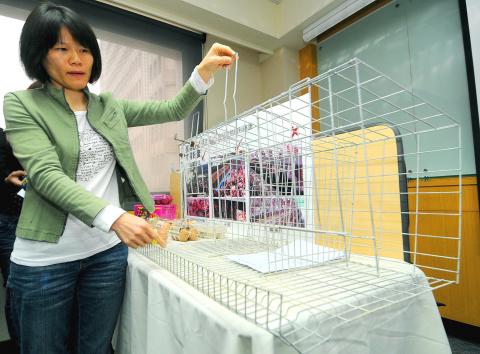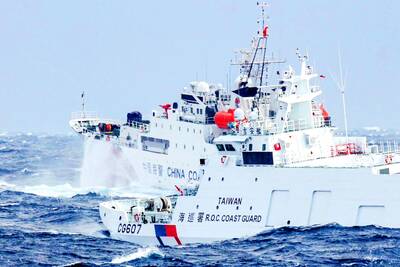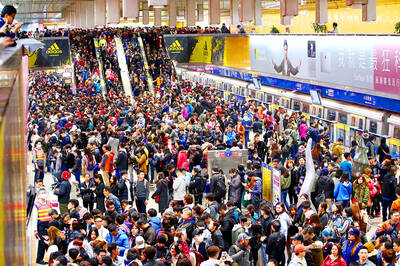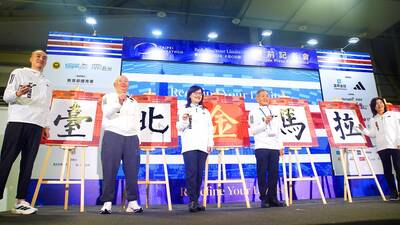Animal right advocates yesterday urged egg farmers to stop what they said was the inhumane practice of raising egg-laying hens in battery cages.
Environment and Animal Society of Taiwan (EAST) director Chen Yu-min (陳玉敏) said the nation produces 6.7 billion eggs per year and that 99 percent of the hens laying those eggs are raised in battery cages.
“About two to four hens are locked in a cage slightly larger than a piece of A4-size paper,” Chen said. “They eat, drink and live in such a small space, tread on one another and peck at each other’s feathers. They cannot even stand with their feet touching the ground.”

Photo: Wang Min-wei, Taipei Times
The society also screened videos showing the plight of egg-laying hens at the press conference yesterday.
EAST executive director Chu Tseng-hung (朱增宏) said that hens raised in cages could suffer from poor metabolism and weak bones, and their owners could also inject them with antibiotics or other drugs to enhance growth. He said that eggs laid by such hens could be unhealthy.
“Not only are they [the eggs] low in nutritional value, they also generate concerns over possible drug residues,” Chu said.
Chu said that hens would have much more space to move around in if they were raised in a barn or allowed to roam outdoors freely, adding that owners would also need to prepare perches for hens to sit on and a sandbox for them to take dust baths in. Only healthy hens could produce healthy eggs, he said.
Chen said that the EU has already been enforcing a battery-cage ban since Jan. 1.
She added that Europe also required that eggs sold in the retail market had to have labels showing how the hens were raised, so that consumers could choose the type of eggs they prefer.
The society also urged consumers to purchase eggs laid by hens that were not raised in battery cages. More chicken farm owners would be motivated to abandon the inhumane practice if their eggs remained unsold.
However, officials from the Council of Agriculture said that more than 1,700 egg farmers around Taiwan would be affected directly, should the nation decide to launch a comprehensive overhaul of how hens are raised.
“Costs will increase by NT$260 per hen if hens are raised in barns, which could be quite a burden to a lot of egg farmers,” said Chou Wen-ling (周文玲), a specialist at the council’s animal protection division.
“Currently, an egg costs between NT$2 and NT$4, but those produced in barns or on free-range poultry farms could cost close to NT$10 each, which consumers might not accept,” he added.
Chou said that it took the EU nearly 20 years to reform breeding methods for hens.
Changing consumers’ perceptions takes time, she said.

READY: The CGA said it closely monitored China’s maritime exercise, deployed vessels to shadow the Chinese ships one-on-one and set up emergency response centers Chinese navy and coast guard ships have returned to China, signaling the end of a massive maritime exercise, authorities said yesterday. The Coast Guard Administration (CGA) released images it said showed Chinese vessels sailing north in rough seas past Taiwan on Thursday, on their way to China. “All the Chinese coast guard went back to China yesterday, so although they have not officially made any announcement, we consider it over,” CGA Deputy Director-General Hsieh Ching-chin (謝慶欽) said. Beijing has not confirmed the drills and the Chinese Ministry of National Defense did not say whether the maneuvers had taken place when asked at a

People can take the Taipei MRT free of charge if they access it at Nanjing Sanmin Station or Taipei Arena Station on the Green Line between 12am and 6am on Jan. 1, the Taipei Department of Transportation said on Friday, outlining its plans to ease crowding during New Year’s events in the capital. More than 200,000 people are expected to attend New Year’s Eve events in Taipei, with singer A-mei (張惠妹) performing at the Taipei Dome and the city government’s New Year’s Eve party at Taipei City Hall Plaza, the department said. As people have tended to use the MRT’s Blue or

PUBLIC TRANSPORT: As some roads would be fully or partially closed, people are advised to take the MRT, with services expanded to accommodate more riders This year’s Taipei Marathon, which has obtained its first gold label certification from World Athletics, is to be held from 5am to 1pm tomorrow and would have 28,000 participants. The race is to start from the Taipei City Plaza and would go through major roads throughout the city, with traffic control implemented from 6am to 2pm, officials said. The Taipei Mass Rapid Transit (MRT) system and New Taipei City MRT Circle line would start operating at 5am on the day of the race, they said. The race would cover Renai Road, Xinyi Road, Hangzhou S Road, Aiguo east and west roads,

Taiwanese professional baseball should update sports stadiums and boost engagement to enhance fans’ experience, Chinese Professional Baseball League (CPBL) commissioner Tsai Chi-chang (蔡其昌) told the Liberty Times (sister paper of the Taipei Times) in an interview on Friday. The league has urged Farglory Group and the Taipei City Government to improve the Taipei Dome’s outdated equipment, including relatively rudimentary television and sound systems, and poor technology, he said. The Tokyo Dome has markedly better television and sound systems, despite being 30 years old, because its managers continually upgraded its equipment, Tsai said. In contrast, the Taipei Dome lacked even a room for referees